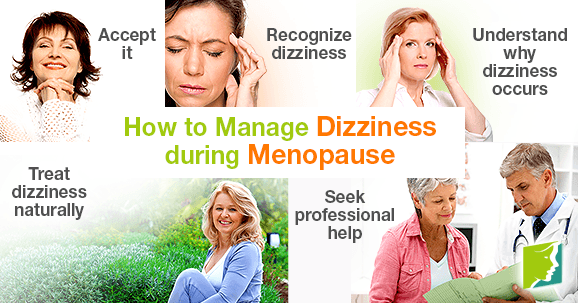The menopausal stage of life is associated with many unpleasant symptoms, including dizziness. Unsteadiness and loss of balance are common when transitioning through menopause. This dizziness is caused by the drastic fluctuations in hormones. To help prevent unexpected and disorienting dizzy spells, take a look at the following five tips.
Easy Steps to Help Manage Dizziness during Menopause
Dizziness is an umbrella term used to describe anything from feeling weak and lightheaded to unsteadiness and a loss of balance. Episodes can be short-lived but can still be debilitating and disturbing.
Step 1: Understand Menopause
Menopause is a natural part of the aging process. Although it can produce unwanted symptoms like dizziness, they will eventually disappear. Being aware of your symptoms and how they affect you will help your transition through this stage easier.
Step 2: Recognize Dizziness
Learn about dizziness during menopause so you're better equipped to treat the problem. The most common symptoms of dizziness include feelings of spinning, off-balance, and instability, as well as feeling faint and weak. Fortunately, episodes can be prevented and the severity lessened.
Step 3: Understand Why Dizziness Occurs
Hormone fluctuations during menopause are the primary reason middle-aged women experience dizziness. Reproductive hormones, specifically estrogen and progesterone, regulate many of the body's functions. If these are not stable, then other bodily functions will become unstable, which creates a number of side effects, such as hot flashes, mood swings, dizziness and osteoporosis. Other menopausal symptoms can provoke and exacerbate feelings of dizziness. Dizziness can also be caused by illnesses such as the flu, low blood sugar, heart problems, and low blood pressure.
Step 4: Treat Dizziness Naturally
When treating dizziness during menopause, the first thing to consider is simple lifestyle changes. For example, an increase in exercise and a healthy diet containing all the essential vitamins and nutrients can have a significant impact on the body. Drinking plenty of water, eating well and exercising regularly can help balance hormone levels and keep dizzy spells at bay.
Step 5: Seek Help if Symptoms are Severe
Some women experience frequent and severe dizziness. In extreme cases, you should consult a medical professional. Dizziness because it is one of the most common complaints of American adults, so there are many different treatments available. They will be able to identify the source of your dizziness and determine the best treatment plan.
Other Causes of Dizziness
Dizziness and balance control problems have multiple causes aside from menopause, and usually are triggered by problems in one of four main areas - the eyes, the heart, the inner ear and our sensory nerves. There are a number of ways to treat dizziness. If you are concerned, always consult a doctor.
Sources
- BMJ Group. "Menopause: What is it?" Patient Leaflet. 2007.
- Hutchinson, Susan M.D. "The Stages of a Woman's Life: Menstruation, Pregnancy, Nursing, Perimenopause, Menopause". November 2007.
- Love, Susan M.D. Menopause and Hormone Book. New York: Three Rivers Press, 2003.



